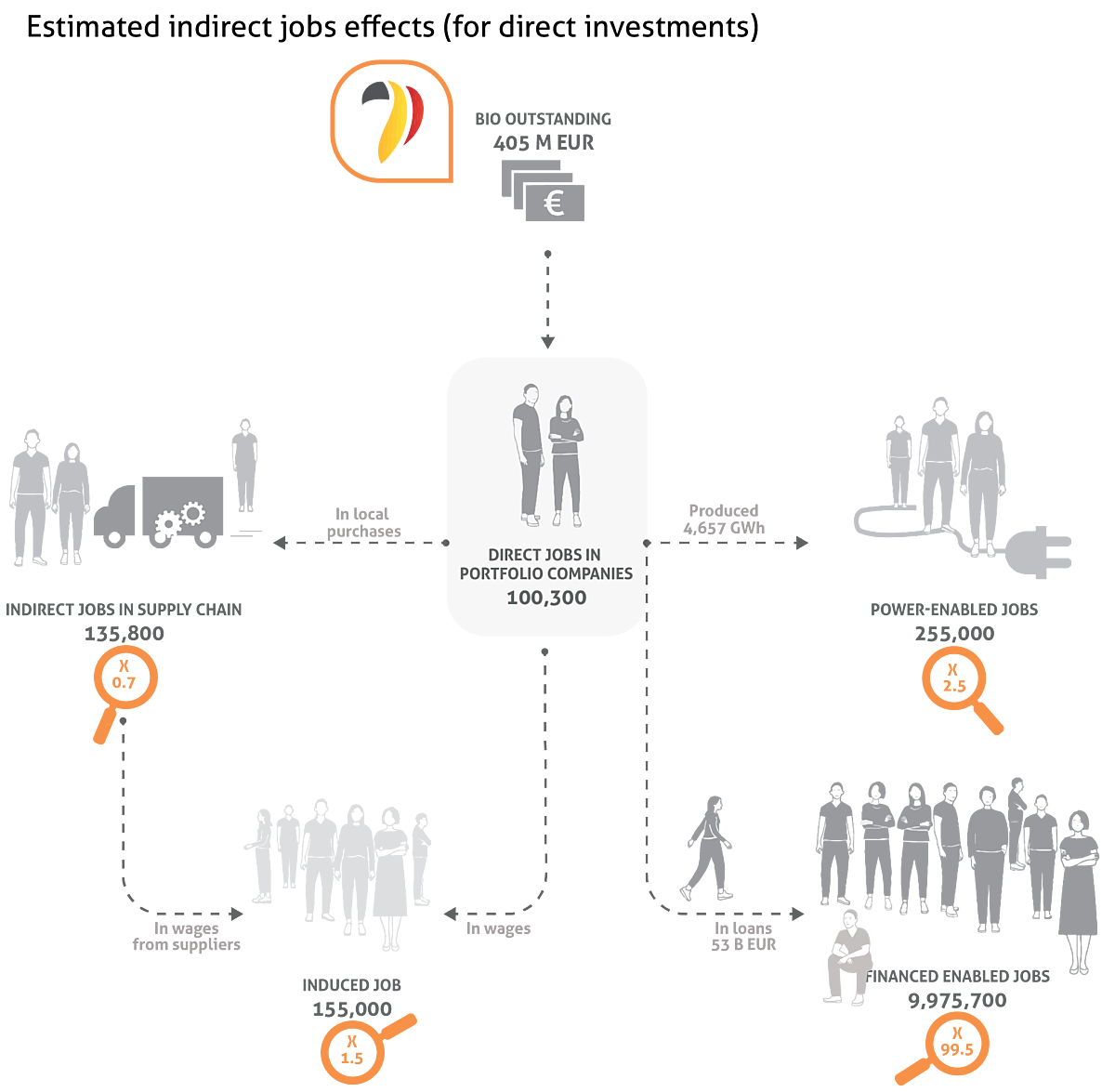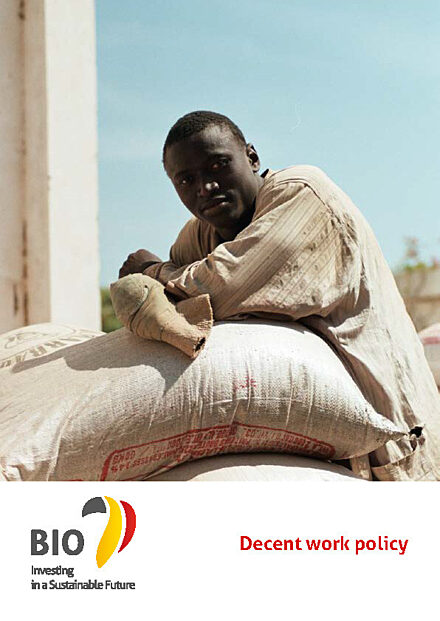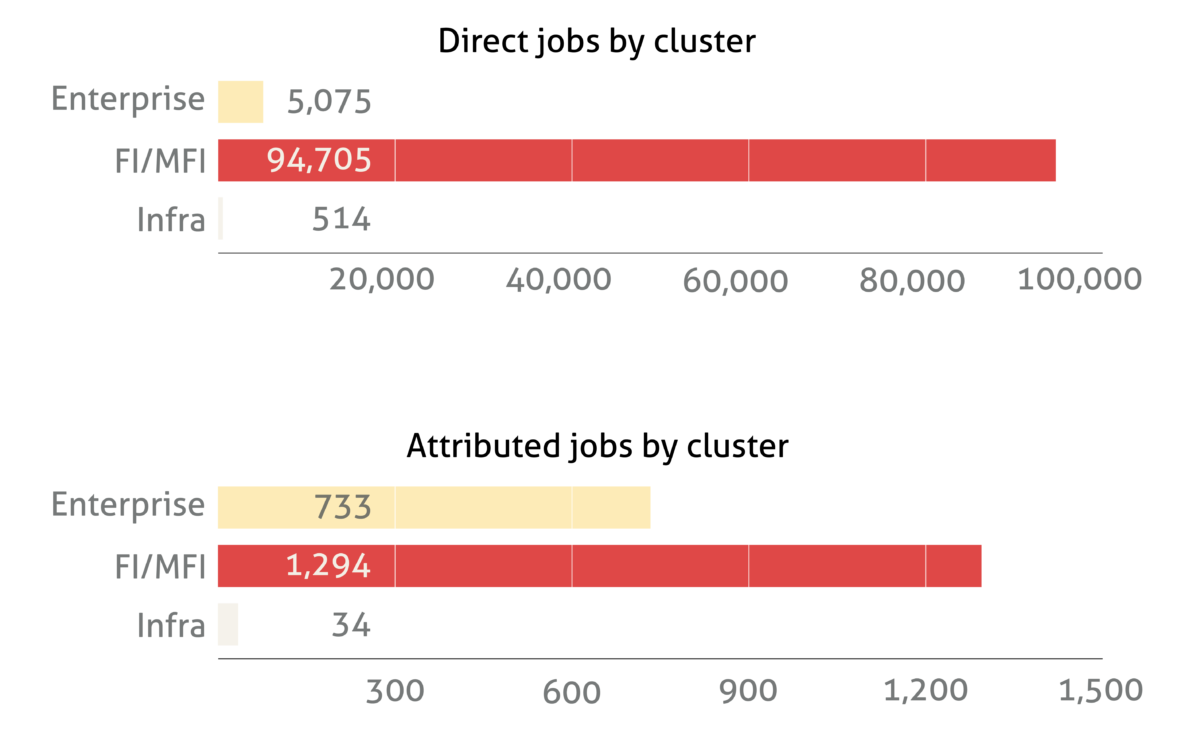Decent work and economic growth
In a context where many countries struggle to achieve SDG8, BIO places decent work as a central objective: as part of its mandate, it aims to support more, inclusive, and better jobs.
SDG8 calls for the promotion of inclusive and sustainable economic growth, employment and decent work for all.
Jobs and economic growth mainly rely on the dynamism of private entrepreneurs: their role is crucial to ensure that jobs and economic growth also benefit more vulnerable groups. One of BIO’s main priorities is to support its clients to expand these economic activities, and to create formal, quality employment for the local population. This is well illustrated by BIO’s recent investments in Inka’s Berries and in Uhuru Growth Fund I, both of which are expected to have a significant impact on local economic growth. Another great example is BIO's indirect investment in Congo Call Center, which is the first introduction to the job market for many.
"In general, young people find it difficult to find their first job because they lack experience. Thanks to Congo Call Center, they have the opportunity for a professional experience of two years, where they pass through a basic customer service training, and acquire job discipline and punctuality, which is essential in the sector. A job in a call centre is very demanding and asks for precision, the performance indicators need to be respected. Courtesy, politeness, a smile, and discipline are key to succeed in this job because revenues are generated through productivity.
While at first, they hate the required discipline, after a while, they realise that all these tools are necessary in their future careers, and they are happy with the experience. When they leave to find a job elsewhere, they’re different people.
You can only work in a call centre for two to three years. That’s why we created an incubator called Ingenious City to support our employees and help them become entrepreneurs. We train them and help them find financing. We have a programme with Orange Corners - an initiative of the Dutch embassy - which finances the incubation of fifty emerging enterprises a year."
Ms Annie Tuluka, managing director of Congo Call Center
Importantly, economy-wide effects also create many jobs indirectly. JIM estimates suggest that in 2021 companies directly funded by BIO supported a total of 5.6 million indirect jobs. Most of these were created by loans from financial institutions (5.3 million). The remaining jobs come with the local purchasing of intermediary goods and services (140,000), wages spent in the local economy (370,000) and on energy (170,000). The investees of the funds in which BIO is invested would indirectly support an extra 1.1 million jobs.

Challenges and opportunities
Labour markets in emerging and developing countries are often poorly regulated. Many jobs are informal, with a lot of casual workers. Wages are generally low and working environments unsafe. Companies’ internal policies are sometimes poorly designed and may have a bad impact on the condition of workers.
That leaves a lot of room for improvement. Consequently, BIO assesses the labour employment and management practices of its potential clients and, in line with its environmental and social policy, requires clients to promote a fair, safe, and secure working environment.
Clients must adhere to all relevant local and international regulations, including the core conventions of the International Labour Organization (ILO). BIO’s reference standard with respect to working conditions is IFC Performance Standard 2. Its investment contracts require its clients to work towards achieving these E&S standards over time.

By promoting sustainable and fair employment creation, BIO ensures decent working conditions and safeguards the basic rights of workers.

The concept of Decent Work developed by the International Labour Organisation (ILO) implies an integrated approach to development and economic growth that takes both the quantity and quality of jobs into account.
In January 2023, BIO’s board of directors approved the decent work policy that aims to clarify the concept, as well as how BIO integrates it throughout its activities.
The policy provides an introduction to the challenges faced in developing countries and states how BIO addresses them through investments, namely by adhering (and ensuring the client and its clients adhere) to
- IFC Performance Standard 2,
- the local laws and the ILO Core Convention,
- the Declaration on Fundamental Principles and Rights at Work, and
- the Basic Terms and Conditions of Employment.
The policy digs deeper into BIO’s requirements and due diligence assessments on the different aspects of decent work and focuses on BIO’s approach with regard to wages, thus explaining how BIO directly contributes to SDG1 (a world with no poverty).
Financial services
BIO invests in companies to stimulate economic growth, innovation, productivity, and financial inclusion. Also, by investing in financial institutions, BIO improves access to financial services for entrepreneurs. Financial services such as savings, insurance, payments, and credit, allow people to manage their lives, grow their businesses, and improve overall prosperity. Investing in financial institutions also has a significant direct impact on job support and creation: 63% of the jobs directly supported by BIO are in FIs or MFIs.

Inka's Berries
In October 2022, BIO committed to invest USD 15 M in Inka’s Berries, a Peruvian company that produces and commercialises blueberry bushes and fresh blueberries for export.
Inka’s Berries aims to incorporate 200 ha of land owned by the Peasant Community of Chambara in the Peruvian coastal region and to transform it into a productive area. The project should create approximately 200 permanent jobs and 1,000 seasonal hirings under formal contracts and good working conditions in this remote area with limited economic opportunities. The community will be paid under an established dividend distribution plan and will have preferential access to jobs and annexed activities generated by the project, other than benefitting from infrastructure improvements deriving from the company’s activities in the area.
The Environmental and Social Action Plan (ESAP) focuses on creating a trusting relationship between the Chambara community and Inka’s Berries: the action plan is expected to serve as a template for future community engagement with Inka’s Berries’ other projects.
Agroserv Industrie
A good example of how BIO’s investments can support substantial improvements in HR management and working conditions is the case of Agroserv Industrie, a Burkinabe maize milling company to which BIO granted a EUR 3 M loan in 2022.
Agroserv is proactively structuring the upstream national agricultural value chain, and provides technical and financial support to a large network of small producers and farmer organisations from which it purchases raw materials. They aim to develop a new agri-food transformation plant to increase their processing capacity and efficiency, which will increase the number of employees by 20% and will create and support additional jobs upstream and downstream. This will mainly benefit the rural population and the local stakeholders, like the small growers involved in the production of maize and soy, the herders who will access additional bran to feed their animals and develop their activities, the equipment suppliers, and the local traders of grains as they will have access to more cereals to trade.
An action plan for further improvement
BIO and Agroserv agreed on an ambitious action plan to improve the working conditions and procedures in the company. Agroserv will design an HR manual and upgrade their internal regulations to ensure that all practices are aligned with local legislation as well as the requirements of IFC PS 2. The company has standardised the employment of temporary workers through collaboration with a third-party agency. Finally, it has included provisions on respecting labour legislation in their supplier contracts.
An external expert is carrying out a health and safety audit of their existing plant. Agroserv has put in place a committee to oversee any health and safety risks, and to set up first aid procedures, roles and trainings.
Technical assistance
In November 2022, BIO approved a EUR 43,924 contribution to Agroserv to implement a 32-month technical assistance project to establish an HR function using a participatory approach, in collaboration with the interim-HR manager and in line with the needs identified in the ESAP.
The project started in June 2022 and is expected to finish in December 2024. Thanks to an external HR consultant, Agroserv will be able to identify the key objectives of the new HR function and will be guided through the set-up of the function.
This will be important to improve the company’s internal policies, operations, and practices linked to governance and resource management, as set out in the ESAP. The goal is for the new HR department to become properly equipped and capable of attracting and retaining the right talents, which is necessary for Agroserv to sustain itself and meet its growth objectives.
The Uhuru Growth Fund I
In 2022, BIO invested USD 8 M in equity in the Uhuru Growth Fund I, a private equity fund seeking to invest in high-growth companies across the Economic Community of West African States. It is managed by an emergent, solid and credible first-time fund manager in West Africa.
The fund aims to invest equity in small and medium-sized companies in the consumer-facing and financial sectors, to support their institutionalisation and growth, other than their expansion in neighbouring markets.
The focus sectors have a strong potential to enable employment and growth: the fund is expected to support at least 3,000 direct jobs and contribute to the creation of 1,000 fair and decent jobs.
Uhuru has a hands-on approach to value creation, with a strong emphasis on enhancing the operations of portfolio companies, enabling internationalisation and thus contributing to cross-border development and import substitution. Uhuru is committed to making responsible investments to create sustainable, long-term value for all its stakeholders by reducing the E&S risks and maximising the value creation potential and development impact in their portfolio companies.
